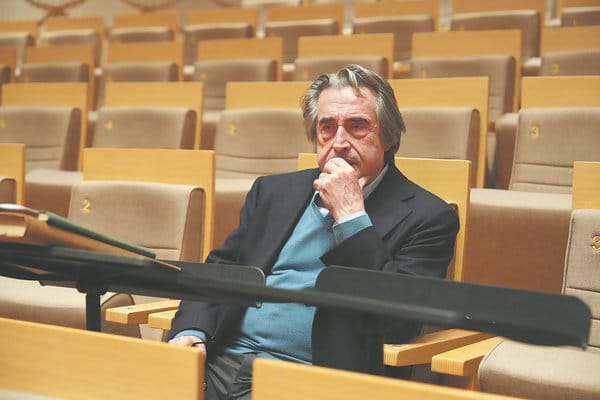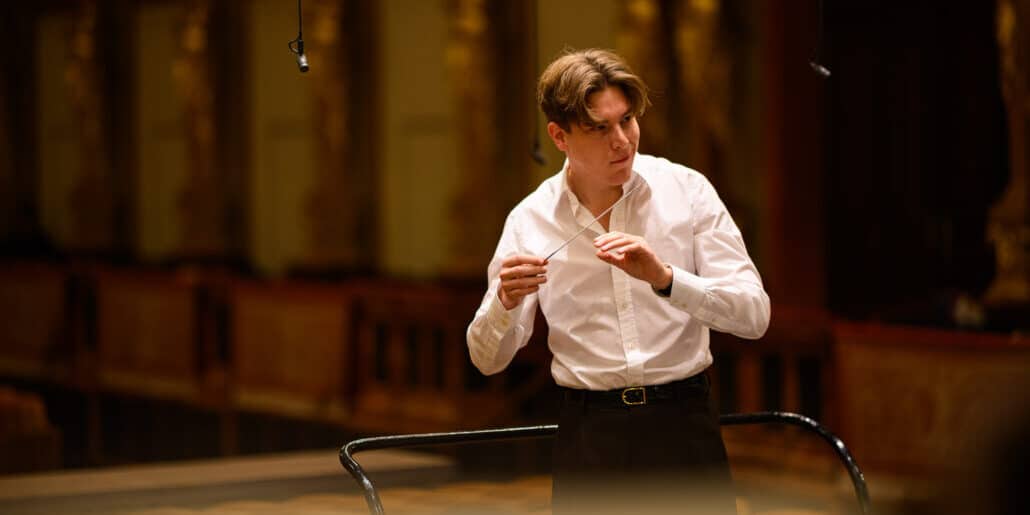Where’s Muti? Teaching Verdi in Suzhou
OperaFrom the China Daily:
When 83-year-old conductor Riccardo Muti reflects on his musical training, he is proud of his teachers, especially Antonino Votto (1896-1985), the Italian conductor who was Arturo Toscanini’s assistant at Milan’s Teatro alla Scala…
“Toscanini knew Verdi. Toscanini played under Verdi at the premiere of Otello. So there is a lineage. All the things that Votto taught me, you don’t find in the books,” says Muti…
With the goal of passing on what he learned from his teachers, he launched the Riccardo Muti Italian Opera Academy in 2015, the first round of which was held in Ravenna. Since then, talented young musicians and an audience of music lovers from all over the world have participated in the annual program, which has been hosted in cities around the world, including Milan, Seoul and Tokyo.
On Saturday, Muti and his program arrived in Suzhou in Jiangsu province, the first time the prestigious event has been held in China. In collaboration with the Suzhou Symphony Orchestra, it has brought together 15 young conductors and seven singers selected from a global pool….
“I come from a time when tradition was highly valued and passed on with respect. But now, unfortunately, tradition seems to be lost,” Muti says.
“Now, conducting seems to be a very easy thing. Though these young conductors have graduated from very famous schools, they know nothing about opera. They just walk onto the stage and wave their arms, which seems to be a performance, or let’s say, an act,” Muti continues. “Votto used to say that a good opera conductor must absorb the ‘dust of the backstage’. You must know the technical aspects, the lighting, and be involved in everything — not just the music.”
More here.






Hopefully he will be influential at the CSO at some level…or it is not looking good…
For once, the Chinese assignment and Muti’s trite and tired b***ing and moaning about young conductors (Makela is the one he probably has in mind the most, followed by Dudamel) speak for themselves and need no additional commentary.
The official name of this peculiar business is “Muti CHINESE-Italian Opera Academy” – caps mine for emphasis 😉 See here: https://szsorch.com/en/riccardo-muti
Oh, at the CSO, he’s influential all right. He denied tenure to David Cooper, a once in a generation horn talent, and hired a subpar principal horn replacement in a hurry to everyone’s outrage, a personnel decision which arguably sank an already damaged orchestra. You can’t do that without influence. He also made the CSO invest in the world premiere of his cousin’s (Coppola is his cousin, we were told by him) movie soundtrack. Again, you need to be pulling the strings in Michigan Av to be able to do that.
There was a beautiful recent post on SD with regards to a re-assessment of Furtwängler where the late Claudio Abbado is quoted: “‘For me, Furtwängler was always the greatest interpreter… Because with him, every note, every phrasing had a logical meaning.’ Abbado continued: ‘Toscanini was different – his music-making was more a very well conducted, schematic, technical affair. With Furtwängler, there was much more music to be heard.’ Abbado specified: ‘As far as the connection between all the notes in the music is concerned, Furtwängler was able to conduct that and let us hear it.’ So much more music! Thanks to Furtwängler, Abbado delved into the deeper layers of the music, into the relationships and proportions of the orchestral sound.”
It’s not a coincidence that Toscanini today is forgotten, while Furtwängler isn’t. Toscanini’s “leanage” of narcissistic, dictatorial chiefs that conduct without making music has produced this: https://youtu.be/1ZWvG_OJ6pI
And I take Makela over this, anytime.
Makela isn’t worthy of even speaking the name Toscanini. What a pathetic joke classical music is. And an unfunny one at that. Everyone gets excited about the latest young hotdog who posts pretty pictures in cds and Instagram. Muti has always been a boring conductor: he gets the job done but without fire. Patanè, Santi, Prêtre, Kleiber, so many others were more exciting in Italian opera. But now he’s the grand old man whom nobody is allowed to criticize. He built his career on intimidation and image. Overrated.
Toscanini is a ridiculously overrated conductor, just like Muti. I think most of his recording are incredibly bad. Toscanini is not really forgotten, Muti is still alive but already is. Abbado was such a much better Italian conductor than these other two, there isn’t even a comparison. He was a real musician and excelled at both opera and the symphonic repertoire, but classic and modern. He will never be forgotten.
I don’t hear anything wrong with the Beethoven. Admittedly, I am not an expert, just a listener.
There is nothing “wrong” with it. Technically, it’s very solid. Musically, it’s very pedestrian, rigid, without much to say.
I know Muti’s work well, he’s been an advocate of “respecting the composer” and just reading the notes. But I always wondered if that is a facade for the fact that he himself doesn’t have much insight into the music. He likes to work with singers on the meaning of the words in Italian opera; his orchestra rehearsal don’t add much. His contributions to French and German operas are virtually none worth of note.
Chicagorat: can you explain what you don’t like about the Muti/Beethoven 7 performance you linked to.
And once again Muti is absolutely correct and astute in his assessment of the current state of the classical arts. Woke is in. Tradition is out. ‘Copy Nothing’ – like the new Jaguar ad…
https://www.youtube.com/watch?v=rLtFIrqhfng
It really is the most ridiculous steaming heap of claptrap I’ve seen in many a long year.
The thing that today’s young conductors (too busy hoovering up one orchestra after another and adding needlessly to the number of recordings already available) don’t understand is how great conductors in the past like Karajan, Sawallisch and Wand learned their craft. They all started in provincial opera-houses. Why is that so important? Because you learn to breathe with your singers and then also with your woodwind and brass players. And you also understand how a singer’s legato line needs to transfer to string players. But these days most young conductors don’t want to know. They certainly don’t fancy working in provincial opera-houses for a good many years, if they can just as easily jet-set around the globe with a PR machine out in force before they arrive at their next venue.
Alexander Hall is so correct in his comments about how most conductors of the past learned their craft. Starting out as repetiteurs and assistant conductors in an opera house, young conductors learned much more than the music and living, working and breathing with singers and orchestras. They became part of the whole complex jigsaw that makes for an opera performance and learned to understand the importance of teamwork also with other departments on the production and technical side.
unless I am very much mistaken, Pappano learned this way….
Correct, so did Thielemann. The question is my mind is what has been happening to the last 1-2 generations of chorrepetiteurs. Why haven’t more of them become famous.
I’ve banged on about this on numerous occasions. These young guns lack the indispensable education of the Ochsentour, the advantages of which Alexander and Nick point out very well.
His picture is like … uh, what the f am I gonna do now? lol
In a way his career has been on a downward trajectory: from London, to Milan, to Chicago, to provincial Italian theaters, and now China. He doesn’t seem to have any self-awareness as to why that might be the case.
I respectfully disagree with your narrative.
First, add Philadelphia to Muti’s list of prestigious posts. Comparing La Scala to the Philharmonic is apples to oranges. Second, I don’t think that moving from the Philharmonia to Philadelphia was anything but an upward move.
In the last decades Muti’s guest conducting gigs have only been with top orchestras like the Bavarian Radio Symphony. Remarkably, he has been continuously reinvented to conduct the Vienna Philharmonic since 1971, in over 500 concerts and operas since 1971; his seventh New Year’s Day concert is coming up in a month.
The Luigi Cherubini youth orchestra he founded in 2004 has been a labor of love.
Like his interpretations or not, he has had a remarkable career. His discography and work with young musicians will leave a significant legacy.
Legacy? Name one world-class singer that was “made” by Muti? Name one solist that was “made” by Muti (a pianist, a violinist, etc?)?
Name one singer launched in main opera houses by the Muti Opera Academy which has been running for almost a decade?
How much is Muti paid in China and who’s paying, the Communist Party?
Cherubini a work of love? More scrutiny should be done by the Italian press on this organization. They (or Muti? or someone?) received plenty of funds from the Italian government, for example they received about 290 thousand euros for the Puccini anniversary concert according to Il Tempo, in addition to another 100 thousand Euros funded by SIAE, a monopolistic intermediary. They were paid a lot of money too for providing entertainment for official EU-level reunions presided by the prime minister Draghi (at least one I remember). The orchestra also does many recordings with Muti, and many concerts. How much of this love in the form of money goes to Muti and how much goes to the young musicians? There is no public information on any of this.
All I tried to do is put his career into perspective, in response to an overly negative comment.
If I were to scrutinize Muti, I would ask how his time with any aspiring young musician compares with the time Votto spent with him decades ago.
No doubt Abbado or even Karajan did more for the young than Muti. But more than two decades with a youth orchestra is nothing to sneeze at. The finances can be discussed only if there is inside knowledge.
Since you asked, I believe that a 2001 Falstaff production launched the career of Ambroglio Maestri.
https://www.youtube.com/watch?v=kFDYgvZWKtg
with all due respect, hannah, i wouldn’t exactly term leading the cso part of a downward trajectory considering he followed solti, barenboim and haitink there. one might suggest he initiated the downward trajectory of the cso. and, you missed philadelphia.
A downward trajectory? To suggest that teaching in China for a week or so marks somewhere near the end of a downward trajectory is just nonsense!
As for Antonio’s comment below about who is paying, why on earth does it matter? It’s clearly the Suzhou Symphony Orchestra which like many orchestras worldwide gets its funding from various sources.
What’s most insufferable about Muti is the disingenuous and systematically self-serving nature of his preaching. There is no backstage to absorb in his Opera Academy as all operas are in concert form.
What’s more irritating about his repetitive comments on the importance of the stage, is that he himself has refused to work with stage conductors (who are beneath him) for a number of years, with two notable exceptions: his daughter Chiara (a theater luminary, I’m sure); and more recently in Turin Andrea De Rosa. This director ingratiated himself by figuratively moving the Ballo in Maschera story to take place, not in Boston as it should, but in the midst of stereotyped Italian architectures inspired by Naples, Muti’s home town. Flattery always work with Muti: the American composer Glass ingratiated himself by writing a piece for Muti dedicated to a castle in Southern Italy.
And guess what … Andrea De Rosa made many of his opera productions at Gergiev’s s Mariinsky Theater of all places.
Next stop for Muti, Russia?
There is nothing “downward” about Chicago. It has been one of the very top orchestras in the world for over 130 years, and remains so today. Ask anyone who has conducted the ensemble, performed with it as soloist, or attends its concerts regularly. You will quickly learn all of the inane bashing on this site, including that from orchestra member Rat, is unfounded. Come to Chicago or attend a concert when the orchestra is on tour before jumping on the highly inappropriate bandwagon. We are blessed to be able to listen to such an extraordinary orchestra, whenever and wherever it performs.
The Conductor is the Model for a General Systems Manager.
Everything matters.